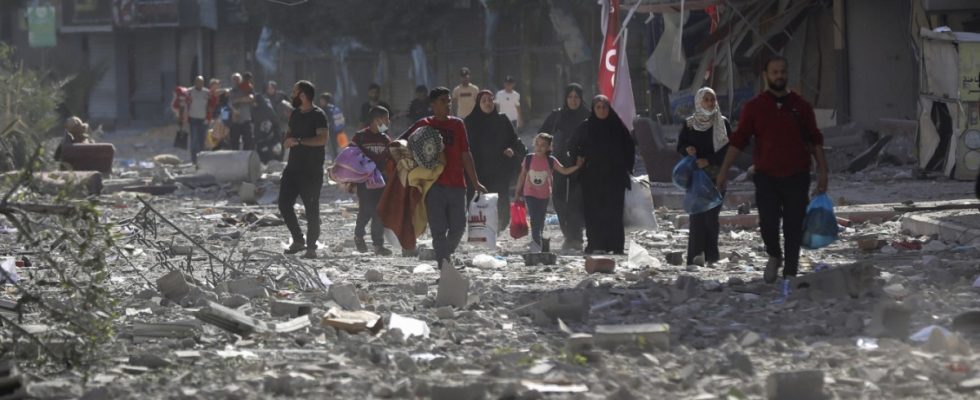War is not only fought with weapons, but also with words. Israeli military spokesman Daniel Hagari presented his information on Monday morning in a sober tone, speaking of “progress”, not successes, and not of a major ground offensive. But what he was saying sounded bigger than what was meant by the term “expanding ground operations.”
In fact, the Israeli army has once again intensified the use of its ground troops. How many Israeli soldiers are in the Gaza Strip, how many tanks – however, no information was given. All that was said was that the soldiers had killed “dozens of terrorists” who had holed up in buildings and tunnels. According to Israeli information, more than 600 targets have been hit in the Gaza Strip in the past few days, and fighter jets and drones may also have flown more missions.
Pictures show what was not said in words. The Israeli army released footage showing tanks making their way through the desert sand and driving along streets past destroyed buildings. There are also videos from the coast of the Gaza Strip. Footage suggests that the Israeli army is already in the suburbs of Gaza City.
A video posted by a Palestinian on social media shows an Israeli tank firing on a vehicle. This happened on Salah-a-Din Street; the Israeli army is apparently blocking this important route to the south. Hamas, in turn, spread a video on social media that supposedly shows an Israeli military vehicle with an apparently dead man being dragged along on a rope.
That day there were also images of destruction from the Gaza Strip, where, according to the Hamas-controlled Ministry of Health, 8,000 Palestinians are said to have already died. The Palestinian Red Crescent said that shortly before an attack, Israeli authorities called for the evacuation of the Al-Kuds hospital, where 14,000 people had sought safety, on Sunday. But fighting between militant Palestinians and Israeli soldiers was also reported in the south of the Gaza Strip.
There was no precise information from the Israeli side about where what happened. The reluctance also has to do with the desire to show consideration for the relatives of the at least 239 hostages who are held by Hamas. Because they fear that a ground offensive will reduce the chances of being released. Since Monday it has been sadly certain that one of the German hostages is dead. 22-year-old Shani Louk, who attended a music festival on the border with the Gaza Strip, had been missing since the Hamas terrorist attack. Her body has not yet been found, but a fragment of her skull bone has been found. Israeli President Isaac Herzog expressed his condolences to the family. According to Israeli authorities, twelve Germans are among the hostages.
Jordan asks the US to station Patriot missiles
Hamas presented three hostages in a video on Monday afternoon, relying on the power of images: The women looked shaken and asked Israeli Prime Minister Benjamin Netanyahu to enable them to be released. In the evening, Israel’s military announced that it had freed one of its female soldiers from hostage during ground operations and that she was doing well.
Hamas also continued its offensive – with intensive rocket fire. There were alarms in numerous places on Monday, rockets flew far into the country, and sirens even wailed in Jerusalem. There was also rocket fire in the north, where Hezbollah may have joined the conflict again. An Israeli soldier died.
In the evening, Prime Minister Benjamin Netanyahu compared Israel’s war against Hamas to the Allies’ fight against the Nazis. At that time, despite civilian casualties, people didn’t say don’t exterminate the Nazis. He answered this in response to a journalist’s question about whether the airstrikes on the Gaza Strip were a collective punishment for Hamas terror that affects all people there.
Jordan already fears the war will expand and has asked the US to station Patriot missiles. Meanwhile, the USA strengthened its naval units in the eastern Mediterranean. A projectile said to have been fired by Houthi rebels from Yemen towards Israel was intercepted over the Red Sea. Also in consideration of Arab reactions, the Israeli army should refrain from using the term “major ground offensive” in the Gaza Strip.
Especially as the clashes in the West Bank intensify, there are also several fronts here: between Israeli security forces and groups of radical Palestinians, between Jewish settlers and Palestinians. The images of settler attacks had an impact and resulted in critical words: The federal government in Berlin called on Israel to do everything possible to protect the Palestinians from the activities of extremist settlers and to hold those responsible accountable. There is also this fight for ground.

